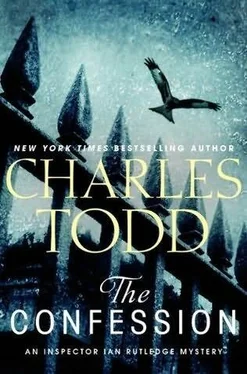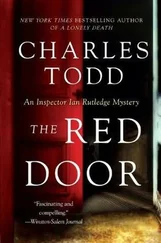Charles Todd - The Confession
Здесь есть возможность читать онлайн «Charles Todd - The Confession» весь текст электронной книги совершенно бесплатно (целиком полную версию без сокращений). В некоторых случаях можно слушать аудио, скачать через торрент в формате fb2 и присутствует краткое содержание. Жанр: Полицейский детектив, на английском языке. Описание произведения, (предисловие) а так же отзывы посетителей доступны на портале библиотеки ЛибКат.
- Название:The Confession
- Автор:
- Жанр:
- Год:неизвестен
- ISBN:нет данных
- Рейтинг книги:5 / 5. Голосов: 1
-
Избранное:Добавить в избранное
- Отзывы:
-
Ваша оценка:
- 100
- 1
- 2
- 3
- 4
- 5
The Confession: краткое содержание, описание и аннотация
Предлагаем к чтению аннотацию, описание, краткое содержание или предисловие (зависит от того, что написал сам автор книги «The Confession»). Если вы не нашли необходимую информацию о книге — напишите в комментариях, мы постараемся отыскать её.
The Confession — читать онлайн бесплатно полную книгу (весь текст) целиком
Ниже представлен текст книги, разбитый по страницам. Система сохранения места последней прочитанной страницы, позволяет с удобством читать онлайн бесплатно книгу «The Confession», без необходимости каждый раз заново искать на чём Вы остановились. Поставьте закладку, и сможете в любой момент перейти на страницу, на которой закончили чтение.
Интервал:
Закладка:
Rutledge caught Barber’s eye. The barkeep had left the impression that the Willet family had had very little to do with the Russell family. “What did local gossip have to say about her disappearance?”
“We thought she’d drowned herself. Well, it was what you’d naturally wonder about, isn’t it? Last seen walking down to the water’s edge?”
“People don’t drown themselves without a reason,” he responded quietly. “Was Mrs. Russell-unhappy?”
“Not precisely unhappy,” Abigail Barber answered, trying to remember. “I do recall my mother saying that she hadn’t seemed like herself in a while, as if something was on her mind. But then the war was coming, wasn’t it, and there was her son and Mr. Fowler, of an age to go.”
“I understand you had brothers about the age of Mr. Russell. Did they ever spend time together-go off on the river together?”
She laughed, her face flushing a becoming pink. “God love you, Mr. Rutledge, I don’t think I’d live long enough to see that day. But Ben had an eye for whatever Mr. Russell was wearing. He longed to be a footman, and someday a gentleman’s gentleman. Once or twice he went up to the house with my father, and he’d come back and say, ‘I wonder how he gets that polish on his shoes,’ or ‘He must have dressed in a bit of a hurry today. The back of his coat wasn’t properly pressed.’ He could mimic their voices too. It came natural to him.”
“Did he indeed? Was he hoping to be taken on as a footman in the Russell household?”
“Oh, no, sir, it wasn’t at all likely. Ben said he’d be best off where he wasn’t known. But what he learned would help him fit in, he said.” She glanced over her shoulder at her husband. “He was a fisherman’s son here. He said he could be anybody somewhere else.”
Ben Willet, so it seemed, was ambitious.
“How did your father take this desire to go into service?”
“He had other sons to go out in the boat with him. That was before the war, of course. Tommy and Joseph never came back from France. But Ben was always his favorite, and I think he was sorry not to have him want to go to sea.”
“Did you know Justin Fowler?”
She shook her head. “He was a cousin or some such, wasn’t he? But I never saw him, that I know of. He didn’t come to Furnham. We put it down to him being more of a snob.”
“Was there bad blood between Russell and Fowler?”
“I wouldn’t know, sir.”
He could hear a weak voice calling from another part of the house.
“My father,” she said, rising quickly. “He’s not well.”
Rutledge rose as well. “One more question. Did Miss Farraday come to the village on occasion?”
Her face hardened. “Oh, yes, I knew who she was. If you want to know, she had an eye for the lads, and no time for the rest of us.”
“Any particular lad?” he asked.
“I saw her once or twice speaking to Ben. But he told me later she hadn’t.”
And then with a hasty excuse, she hurried back to her bedside watch.
Rutledge said, “Thank you. Mrs. Barber was very helpful.”
“Was she?” Barber was urging him toward the door. He lowered his voice. “To my way of thinking you’re no closer to knowing about Ben than you were before. I told you it was no use speaking to my wife.”
“No closer to finding his killer, perhaps.”
Barber said, an edge to his voice, “Then what was that all about?”
“Catching you in several lies.”
“What lies?”
But Rutledge gave him no answer. And they walked in uneasy silence back to where he’d left his motorcar.
R utledge had stayed longer than he’d intended in Essex. He set out for London, and driving out of Furnham, he felt a sense of relief as the village disappeared in his mirror, reduced to a tiny rectangle of glass.
In the war, he’d been blessed with a strong sixth sense, which had kept him alive far more times than he’d deserved. And unexpectedly that had stayed with him as he’d resumed his career.
There was something wrong in Furnham. Not just Ben Willet’s killing, but something else that seemed to reside in the very bricks and mortar of the village. Frances had felt it and had been made uneasy by what she’d called the whispering of the grasses. If there was such a thing as a communal conscience, he thought, it was laden with guilt.
Barber had been defending his wife and her family, and that was understandable. But the easy shift from surly to murderous was not common. The club Rutledge had taken from the man could have been lethal, and the back windows of the pub looked out over the river, offering a swift passage to the sea for an unwanted body. The narrow estuary, with few shallows to trap a corpse, was at a guess not a quarter of a mile away, the current running strong.
What was appalling was Barber’s certainty that his patrons would hold their tongues if he’d killed the interloper in the pub.
Hamish said, “If someone there killed yon victim, ye willna’ ever ferret him oot.”
And Rutledge believed him.
Whatever had knit that village together so tightly, Ben Willet had escaped it. And Rutledge found it hard to believe that he’d been punished for it so many years later. What then had he done in the past few months that had put him beyond the pale?
But what to make of the fact that the body in Gravesend was not Russell’s?
What to make of Ben Willet’s passing himself off as another man while confessing to murder?
Was that what had put Willet beyond the pale? Had his conscience driven him to bring a murder to the attention of Scotland Yard in the only way he’d dared?
The next step, then, was to find Major Wyatt Russell and see what he had to say.
Chapter 6
When the gates of River’s Edge loomed ahead, the pineapples atop the posts promising a hospitality that was far in the past, late as he was, Rutledge stopped the motorcar and got out.
He had come earlier with a different perspective. The house had belonged to a confessed murderer. Or so he’d been led to believe. And for all he knew-given the reluctance of the man passing himself off as Wyatt Russell to give any details of his crime-the body could still be somewhere here.
With his sister present, he’d been content to look at the house and grounds, noting the marshes across the river and on either side of the acres of once smooth lawn on which the house had been set. And it had seemed all too likely that the house had remained closed because the memories it evoked were disagreeable.
Now as he walked down the long, brush-choked drive and made his way around to the riverfront, he had a clearer picture in his mind of the people who once had lived in this house.
Standing on the terrace, he gazed out over water dancing in the sunlight with an almost macabre gaiety. On a warm August day when the clouds of war were gathering on the horizon and threatening her son, as another war had taken her husband, Mrs. Russell had gone down these shallow steps and walked to the river’s edge.
Had worry for her son really taken her there? And had that worry been strong enough to drive the woman to suicide?
Nevertheless, she’d vanished. The police had been satisfied. Still, it was possible that they had heard what they wanted to hear. And when there was no evidence to the contrary, it was easier to accept the unlikely.
Nor had her son questioned the verdict or appealed to the Chief Constable for Scotland Yard to intervene.
It would be easier to accept a confession by the false Wyatt Russell that he had killed his mother, not Justin Fowler.
That brought up another issue. Would Elizabeth Russell have killed herself and left behind the three children that she had once thanked God for giving her?
Читать дальшеИнтервал:
Закладка:
Похожие книги на «The Confession»
Представляем Вашему вниманию похожие книги на «The Confession» списком для выбора. Мы отобрали схожую по названию и смыслу литературу в надежде предоставить читателям больше вариантов отыскать новые, интересные, ещё непрочитанные произведения.
Обсуждение, отзывы о книге «The Confession» и просто собственные мнения читателей. Оставьте ваши комментарии, напишите, что Вы думаете о произведении, его смысле или главных героях. Укажите что конкретно понравилось, а что нет, и почему Вы так считаете.












